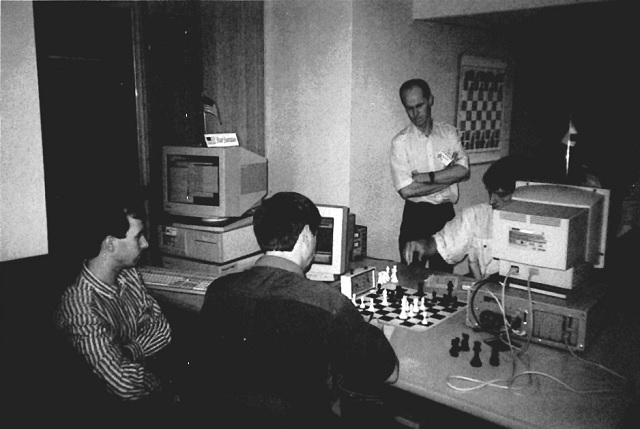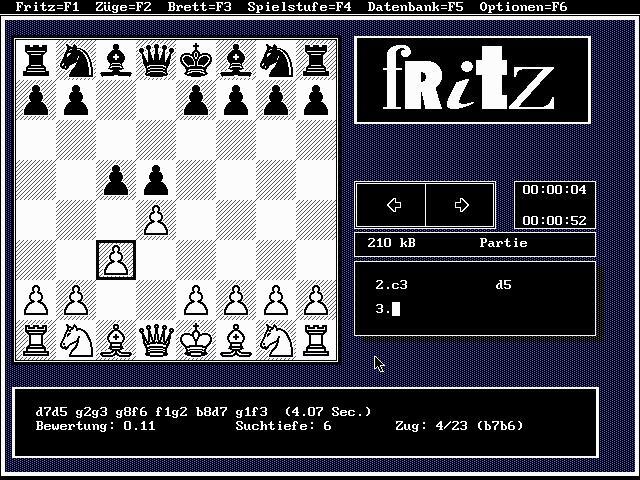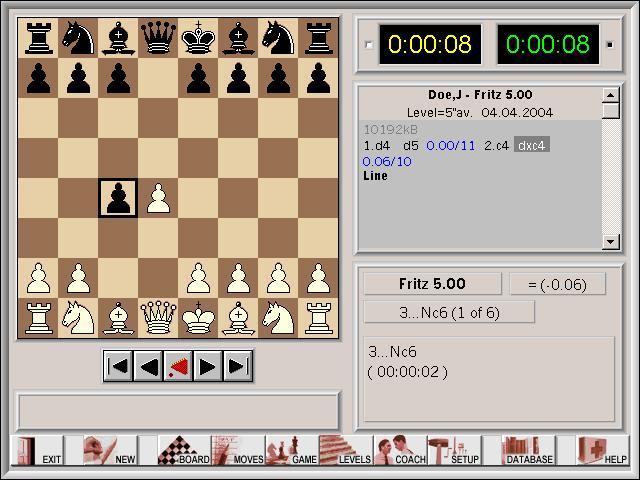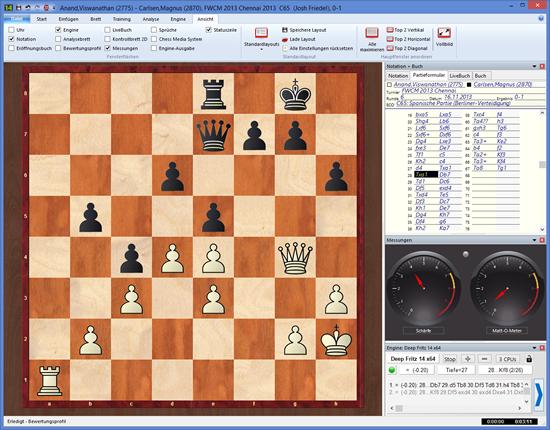Fritz
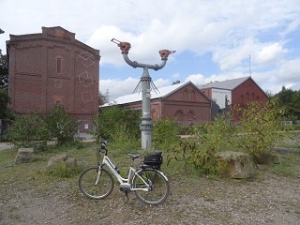
Fritz (early versions called Knightstalker in the USA),
a series of chess programs published by ChessBase, until Fritz 13 the engine developed by primary author Frans Morsch and Mathias Feist,
Deep Fritz 14 released in November 2013 by Gyula Horváth [2],
Fritz 15 and 16 in November 2015 and 2017 by Vasik Rajlich [3], and Fritz 17 and 18 in November 2019 and 2021 by Frank Schneider.
Fritz 1-13 were based on Frans Morsch's program Quest, and was first marketed by ChessBase in 1991 as MS-DOS program with its own Graphical User Interface [4] . Since version 4, released in 1996, Fritz ran on Windows, and is until today one the world’s most popular and successful chess programs. At the WCCC 1995, Fritz became World Computer Chess Champion, winning a notable game versus Deep Blue prototype [5] and the playoff [6] against Star Socrates.
Contents
Etymology
The given name Fritz originated as a German nickname for Friedrich, or Frederick (der "Alte Fritz" was a nickname for King Frederick II of Prussia, and of Frederick III, German Emperor [7]), as well as for similar names including Fridolin. Fritz was also a name given to German troops by the British and others in the first and second world wars, equivalent to Tommy, as the British troops were called by German and other troops [8] . Creative ChessBase partner Olaf Oldigs [9] had suggested the name Fritz for the chess program [10] .
Selected Games
Deep Blue Prototype
WCCC 1995, round 5, Deep Blue Prototype - Fritz [11]
[Event "WCCC 1995"] [Site "Chinese University HKG"] [Date "1995.05.29"] [Round "5"] [White "Deep Blue Prototype"] [Black "Fritz"] [Result "0-1"] 1.e4 c5 2.Nf3 Nc6 3.d4 cxd4 4.Nxd4 Nf6 5.Nc3 e5 6.Ndb5 d6 7.Bg5 a6 8.Na3 b5 9.Bxf6 gxf6 10.Nd5 f5 11.Bd3 Be6 12.Qh5 f4 13.O-O Rg8 14.Kh1 Rg6 15.Qd1 Rc8 16.c4 Qh4 17.g3 Qh3 18.Qd2 f3 19.Rg1 Rh6 20.Qxh6 Qxh6 21.cxb5 Bxd5 22.exd5 Nb4 23.Bf5 Rc5 24.bxa6 Nxa6 25.Nc2 Qd2 26.Ne1 Rxd5 27.Nxf3 Qxf2 28.Be4 Ra5 29.Rg2 Qe3 30.Re1 Qh6 31.Bc6+ Kd8 32.a3 f5 33.Rc2 Rc5 34.Rxc5 Nxc5 35.Rf1 Be7 36.a4 f4 37.gxf4 Qxf4 38.Rg1 Nxa4 39.b4 Qxb4 0-1
Star Socrates
WCCC 1995 Playoff, Star Socrates - Fritz, Chris Joerg, Don Dailey, Frans Morsch, and Mathias Feist @ 26... Nd5 [12] [13]
[Event "WCCC 1995"] [Site "Chinesse University HKG"] [Date "1995.05.30"] [Round "6"] [White "Star Socrates"] [Black "Fritz"] [Result "0-1"] 1.e4 e5 2.Nf3 Nc6 3.Bb5 Nf6 4.O-O Bc5 5.Nxe5 Nxe5 6.d4 a6 7.Ba4 Nxe4 8.Qe2 Be7 9.Qxe4 Ng6 10.f4 O-O 11.Bb3 Bf6 12.Nc3 c6 13.Qd3 d5 14.Be3 b6 15.f5 Ne7 16.Rf3 c5 17.dxc5 d4 18.Rd1 Bb7 19.Bxd4 Bxf3 20.gxf3 Bxd4+ 21.Qxd4 Qxd4+ 22.Rxd4 bxc5 23.Rf4 Rac8 24.Bc4 Rc6 25.Ne4 Rd8 26.Kf2 Nd5 27.Rg4 Kf8 28.Rh4 Nf6 29.Ke3 h6 30.b3 Rd1 31.a3 Ra1 32.a4 Rd1 33.Bd3 Ke7 34.Ke2 Rg1 35.Rh3 Nd5 36.Rg3 Rh1 37.Rxg7 Rxh2+ 38.Kf1 Kf8 39.Rg3 Rh5 40.Kf2 Nb4 41.f6 Nd5 42.Rg1 Nxf6 43.Rd1 Re5 44.Nd2 Nd5 45.Nc4 Rg5 46.Be4 Nc3 47.Bxc6 Nxd1+ 48.Ke1 Nc3 49.f4 Rh5 50.Kd2 Nd5 51.Bb7 Ke7 52.Kc1 Nxf4 53.Bxa6 Rh2 54.Ne3 Ne2+ 55.Kb2 Nd4 56.Bc4 Nc6 57.Bb5 Na5 58.Nc4 Nxc4+ 59.Bxc4 f5 60.a5 Kd6 61.Kc3 h5 62.a6 Kc7 63.Be6 Rf2 64.a7 Kb7 65.Kd3 h4 66.a8=Q+ Kxa8 67.Ke3 Rxc2 68.Bxf5 Rc3+ 69.Kf2 Rxb3 70.Be4+ Ka7 71.Bd5 Rb2+ 72.Kg1 h3 73.Be6 h2+ 74.Kh1 Ka6 75.Bd5 0-1
Null Move
Frans Morsch, as well as other Dutch computer chess programmers like Bart Weststrate and Dap Hartmann [14] , did early experiments with recursive null move pruning in the late 80s, likely after it was discussed at the panel workshop during the WCCC 1986 after Don Beal's talk covering null move [15] [16] . Frans Morsch told Chrilly Donninger about recursive null move, who popularized it by his Null Move and Deep Search paper in the ICCA Journal 1993 [17] .
Descriptions
from the ICGA tournament page [18] :
1995
Fritz is built around a selective search technique known as null-move search. As part of its search, Fritz allows one side to move twice (the other side does a null-move). If the position after the null-move does not return a high value in the evaluation function, then clearly the first of the two moves did not contain a threat. This applies to 95% of the moves in a search. Detecting such moves before they are searched to the full depth is an excellent method to speed-up the search. In its latest version, Fritz manages a 10-times speed-up over a version without the null-move search. Selective search unavoidably introduces oversights, but these are few. In tournaments against humans and other programs, Fritz has proven to be a tough opponent when defending difficult positions.
1997
Fritz won the ICCA chess computer world championship in Hong Kong 1995 beating a prototype of the Deep Blue chess computer. It obtained the best computer result in the 1996 man-computer Aegon tournament. Fritz is build around a selective search technique known as the null-move search. Move generators, evaluation functions and data structures have been designed specially to maximise the effectiveness of the null-move search. If anything, Fritz is fast. The search engine is written in highly optimised assembly language. The present version searches at a rate of one thousand processor cycles per position. The openings book was constructed from grandmaster games. Fritz learns from his games and adjusts the probability weights in the openings book automatically.
1999
Fritz is build around a selective search technique known as the null-move search. As part of its search, Fritz allows one side to move twice (the other side does a null-move). This allows the program to detect weak moves before they are searched to their full depth. Move generators, evaluation functions and data structures have been designed to maximize the effectiveness of the null-move search. Fritz is the winner of the previous computerchess world championship in Hong Kong 1995. 1993 Fritz tied for 1st place in a Blitz tournament in Munich with the complete world elite. It scored the best computer result in the 1996 man-computer Aegon tournament. In 1998 Fritz was leading the prestigious Swedish rating list. It won an active chess tournament Frankfurt 1998 with a full point ahead of 36 grandmasters.
Deep Fritz
Deep Fritz is the engine designed for multiprocessing and parallel search, it first appeared as Deep Fritz 6 in 2000. Since version 14 by Gyula Horváth, Deep is obligatory.
Fritz SSS
A Fritz version called SSS [19] or even SSS* [20] that played the Dutch Chess Championship 2000 in Rotterdam, becoming third with 7/11 behind Loek van Wely, and Jeroen Piket, shared with Sergei Tiviakov and Paul van der Sterren [21], was not related to the SSS* search algorithm, but to the three primary sponsors of the event [22] [23].
Pocket Fritz
Pocket Fritz is a chess program for PocketPC Personal digital assistants (PDAs). Pocket Fritz 4 is based on HIARCS by Mark Uniacke, Pocket Fritz 2 used a port of Shredder by Stefan Meyer-Kahlen [24] .
Fritz User Interface
Fritz 1
The original Fritz MS-DOS Graphical User Interface from 1991 [25]
Fritz 5
Fritz 5 Windows Graphical User Interface [26]
Deep Fritz 14
Deep Fritz GUI is suited to run other ChessBase or UCI engines with either using its own proprietary protocol, as well as the UCI protocol.
Deep Fritz 14 GUI [27]
Authors
Book Authors
See also
- ChessBase
- ChessBase (Database)
- Chessica
- CTG - ChessBase opening book format
- Fat Fritz
- Fridolin
- Ginkgo
- Knowledge | Search versus Evaluation
- Null Move Pruning
- Pandix
- Quest
- Rybka
Release Dates
Frans Morsch
- Fritz 1.0 : 1991
- Fritz Deluxe : 1992
- Fritz 2.0 : 1992 or 1993
- Fritz 2.51 : 1994
- Fritz 3.0 : 1994 or 1995
- Fritz 4.0 : 1995 or 1996
- Fritz 5.0 : 1997 or 1998
- Fritz 5.32 : 1998 or 1999
- Fritz 6 : 2000
- Deep Fritz : 2000
- Fritz 7 : July 2001
- Fritz Bahrain : November 2002
- Deep Fritz 7.0 : 2003
- Fritz 8 : September 2003
- X3D Fritz : November 2003
- Fritz 8 Bilbao : December 2004
- Deep Fritz 8.0 : 2005
- Fritz 9 : December 2005
- Fritz 10 : October 2006
- Deep Fritz 10 : December 2006
- Fritz 11 : November 2007
- Deep Fritz 11 : November 2008
- Fritz 12 : October 2009
- Deep Fritz 12 : July 2010
- Fritz 13 : October 2011
- Deep Fritz 13 : June 2012
Gyula Horváth
- Deep Fritz 14 : November 2013
Vasik Rajlich
- Fritz 15 : November 2015
- Fritz 16 : November 2017
Frank Schneider
- Fritz 17 : November 2019
- Fritz 18 : November 2021
Matches
- Kramnik versus Deep Fritz 2002
- Kasparov versus X3D Fritz 2003
- Kramnik versus Deep Fritz 2006
- Deep Fritz versus Deep Junior 2007
Publications
1995 ...
- Fabian Mäser (1995). Fritz vs.Deep Blue: Opening Book vs, Opening Book. Computer Chess Reports, Vol. 5, No. 2, pp. 22 » WCCC 1995
- Robert Hyatt (1995). Still more Fritz vs. Deep Blue: Opening Book vs, Opening Book. Computer Chess Reports, Vol. 5, No. 2, pp. 22
- Larry Kaufman (1995). Does Fritz deserve to be World Champion? Selective Search 60, pp 3, pdf hosted by Mike Watters
2000 ...
- Karsten Müller (2002). The Clash of the Titans: Kramnik – Fritz Bahrain. ICGA Journal, Vol. 25, No. 4 » Kramnik versus Deep Fritz 2002
- Matthias Wüllenweber (2002). The Match from Fritz' View Point. ICGA Journal, Vol. 25, No. 4
- David Levy (2003). Kasparov vs X3D Fritz. ICGA Journal, Vol. 26, No. 4 » Kasparov versus X3D Fritz 2003
2005 ...
- Mark Levene, Judit Bar-Ilan (2005). Comparing Move Choices of Chess Search Engines. ICGA Journal, Vol. 28, No. 2, pdf » Junior
- Christian Liebert (2005). Fritz 9: Der König ist zurück. Computerschach und Spiele Online, pdf (German)
- Christian Liebert (2006). Fritz die Zehnte. Computerschach und Spiele Online, pdf (German)
- Matthias Wüllenweber, Frederic Friedel, Mathias Feist (2006). Kramnik vs. Deep Fritz 10: Computer wins match by 4-2. ICGA Journal, Vol. 29, No. 4 » Kramnik versus Deep Fritz 2006
- Eric Hallsworth (2007). Vladimir Kramnik (World Champion) v Deep Fritz 10. Selective Search 128, pp. 14-24, pdf hosted by Mike Watters
Forum Posts
1991 ...
- Commercial Chess Programs by Mike Valvo, rgc, July 19, 1991 » ChessMachine, MChess, Zarkov
- KnightStalker Demo by Benjamin Lin, rgc, December 29, 1992
- ChessBase for Windows and/or Fritz 3 Review by Johannes Fürnkranz, rgc, September 06, 1994 » ChessBase (Database)
- Fritz 3 ELO on different computers by Moritz Berger, rgc, September 19, 1994
1995 ...
- Fritz 3 Makes IM Norm by Michel Behna, rgc, January 31, 1995
- Deep Thought /WCCC Round 5 vs Fritz by Robert Hyatt, rec.games.chess, May 31, 1995 » WCCC 1995
- Fritz 4 and the SSDF by Moritz Berger, rgcc, June 27, 1996 » SSDF
- LCT II results of Reb9, F5, and H6 on K6/233 by Albert Silver, CCC, January 03, 1998 » LCT II, Rebel, HIARCS
- Fritz 5 by Didzis Cirulis, CCC, February 06, 1998
- Multi-Fritz with Boss versus IM R. Vasquez by Ingo Althöfer, CCC, March 09, 1999 [28]
- Tactical monsters: Fritz5.32 and Goliath 2.05 by Jouni Uski, CCC, August 03, 1999
2000 ...
- How make Fritz execute brute force search? by Leonid, CCC, July 26, 2000
- Junior chess program. Just version of Fritz 5? by Leonid, CCC, July 29, 2000 » Junior
- Deep Fritz won the Cadaques tournament by Enrique Irazoqui, CCC, February 06, 2001 [29]
- Fritz7 o-o-o bug by Hans van der Zijden, CCC, December 24, 2001
- Re: Fritz protocol by Odd Gunnar Malin, Winboard Forum, April 14, 2002 » Wb2UCI
- Re: Something new about Fritz? English by Sven Reichard, CCC, June 23, 2002
- Re: Something new about Fritz? English, part 2 by Sven Reichard, CCC, June 24, 2002 » Eduard Nemeth
- How to create Fritz native engine? by Igor Korshunov, Winboard Forum, March 13, 2003
- Request for link to Eduard Nemeth messages about Fritz 8.0.0.23 by Javier Ros Padilla, CCC, March 17, 2003 » Eduard Nemeth
- Re: Shredder 8 secret: search depth? by Vasik Rajlich, CCC, March 23, 2004 » Depth, Shredder, Junior
2010 ...
- Fritz 12 by Alexander Schmidt, CCC, May 31, 2011
- Fritz and Naum shown as Rybka/Strelka clones by Kai Laskos, CCC, October 17, 2011
- Deep Fritz 11 eval by BB+, OpenChess Forum, October 23, 2011
- Are Fritz and Naum Rybka/Strelka clones? by SR, Rybka Forum, November 09, 2011
- New Fritz author? by John Hartmann, CCC, November 19, 2013
- Re: New Fritz author? by Albert Silver, CCC, November 20, 2013
- Re: First Impressions (Deep Fritz 14)? by Albert Silver, CCC, November 22, 2013
- Deep Fritz 14 BUG by Rimbaud Sam, Rybka Forum, November 29, 2013
- Allegations that Deep Fritz 14.... by Dr.Wael Deeb, CCC, Engine Origins, December 03, 2013
- Fritz 11 by Rebel, OpenChess Forum, December 10, 2013
- ChessBase / Fritz interface running on Ubuntu? by Norbert Raimund Leisner, CCC, December 17, 2013 » Linux
2015 ...
- Fritz 15 (Vas Rajlich?) by Graham Banks, CCC, July 24, 2015 » Vasik Rajlich
- Fritz 15.0 by Tim Shackel, CCC, November 20, 2015
- "Sampled search" ? by albitex, Rybka Forum, February 23, 2016
- Fritz 16 by David Shanholtzer, CCC, November 12, 2017
- Anybody has an opinion about Fritz 16? by Fernando Villegas, CCC, November 15, 2017
- Fritz 13 SE? by Steve Maughan, CCC, September 16, 2018
- Fritz 17 by sainzlei, CCC, October 25, 2019
2020 ...
- Fritz 18: Evolving Genius by Ted Summers, CCC, November 14, 2021
External Links
Chess Engine
- Fritz' ICGA Tournaments
- Fritz (chess) from Wikipedia
- Pocket Fritz from Wikipedia
- The chess games of Fritz from chessgames.com
Purchase
- Fritz 18 - ChessBase Shop
- Fritz 17 - The giant PC chess program, now with Fat Fritz - ChessBase Shop
- Fritz 15 - English Version, ChessBase Shop
- Deep Fritz 14 - ChessBase Shop
ChessBase News
- Fritz Defends to Draw Game 8 and the Match! Final Score: 4-4 The Brains in Bahrain Man-Machine match is over, from ChessBase News, October 19, 2002
- Kasparov vs X3D Fritz match finishes 2-2 after game four draw from ChessBase News, November 19, 2003
- Deep Fritz 8 review by Steve Lopez, ChessBase News, December 27, 2003
- Mate search in Fritz by Steve Lopez, ChessBase News, August 07, 2004
- Fritz 9 3D boards – part 1 by Steve Lopez, ChessBase News, January 10, 2006
- Fritz 9 3D boards – part 2 by Steve Lopez, ChessBase News, January 17, 2006
- Fritz 9 3D boards – part 3 by Steve Lopez, ChessBase News, January 25, 2006
- Man vs machine shocker: Kramnik allows mate in one, Bonn, November 27, 2006
- Kramnik vs Deep Fritz: Computer wins match by 4:2, ChessBase News, December 05, 2006
- Deep Fritz 12 – an interview with the author, ChessBase News, February 17, 2010
- Fritz 13 is now available – let's check who needs it!, ChessBase News, October 13, 2011
- Deep Fritz 13 with blow-your-mind functions, ChessBase News, June 08, 2012
- Deep Fritz 14: Faster, better, cheaper, ChessBase News, November 20, 2013
- Deep Fritz 14 – Elo 3150 on your computer by Sean Marsh, ChessBase News, January 28, 2014
- From Chess Challenger to Deep Fritz 14 by Ken Blake, ChessBase News, February 27, 2014 » Chess Challenger
- Analyzing your games with Fritz (Part one) by Albert Silver, ChessBase News, June 02, 2014
- Analyzing your games with Fritz (Part two) by Albert Silver, ChessBase News, June 04, 2014
- Analyzing your games with Fritz (Part three) by Albert Silver, ChessBase News, June 07, 2014
- Deep Fritz 14 now with ChessBase for Android by Albert Silver, ChessBase News, February 23, 2015 » Android
- Using Deep Fritz 14 on a smartphone by A. Ganesan, ChessBase News, April 13, 2015 » Android
- Come and get it – Fritz 15 released!, ChessBase News, November 25, 2015
- Fritz 15 engine - questions and answers by Albert Silver, ChessBase News, January 04, 2016
- Using your home chess engine anytime, anywhere by Albert Silver, ChessBase News, May 09, 2017
- Fritz 16 – your companion and trainer, ChessBase News, November 12, 2017
- Fritz 16 — a fun and instructive opponent by Albert Silver, ChessBase News, December 11, 2017
- Introducing Fritz 17 with Fat Fritz and other goodies, ChessBase News, November 12, 2019
- Thirty years! Happy Birthday Fritz (1) by Frederic Friedel, ChessBase News, November 05, 2021
- Thirty years! Happy Birthday Fritz (2) by Frederic Friedel, ChessBase News, November 09, 2021
- Thirty years! Happy Birthday Fritz (3) by Frederic Friedel, ChessBase News, November 13, 2021
- Thirty years! Happy Birthday Fritz (4) by Frederic Friedel, ChessBase News, November 23, 2021
- Thirty years! Happy Birthday Fritz (5) by Frederic Friedel, ChessBase News, December 19, 2021 » Kramnik versus Deep Fritz 2002
- Thirty years! Happy Birthday Fritz (6) by Frederic Friedel, ChessBase News, January 10, 2022 » Kramnik versus Deep Fritz 2006
- Fritz 18: Evolving Genius, ChessBase News, November 14, 2021
Chess US
- Fat Fritz and Fritz 17: A Review (Part I) by John Hartmann, US Chess, November 17, 2019
- Fat Fritz and Fritz 17: A Review (Part II) by John Hartmann, US Chess, November 19, 2019
Rating Lists
Misc
References
- ↑ Former coal mine Unser Fritz 2/3 in Herne, North Rhine-Westphalia, Germany, now artist-studio, exhibition and event space, and part of The Industrial Heritage Trail of the Ruhr area - Image of protegohaube (flame arrester) as gnomon of a sundial and machine halls behind by Gerd Isenberg, bike tour, September 16, 2016. Unser Fritz/Crange is further district of Herne (Wanne), famous for its funfair Cranger Kirmes, and SV Unser Fritz the local chess club - eponym of the coal mine was Frederick III, German Emperor, see also Künstlerzeche Unser Fritz 2/3 - Chronik (German) and 2011 Image by Frank Vincentz
- ↑ New Fritz author? by John Hartmann, CCC, November 19, 2013
- ↑ Fritz 15 - English Version, ChessBase Shop
- ↑ Christmas dinner on a train – meet the ChessBase team from ChessBase News, December 23, 2003
- ↑ Fabian Mäser (1995). Fritz vs. Deep Blue: Opening Book vs, Opening Book. Computer Chess Reports Vol. 5 No. 2 pp. 22, WCCC 1995
- ↑ Shatin 1995, Chess, Round 6, Game 1
- ↑ Der alte Fritz (1928) Wikipedia.de (German)
- ↑ Fritz from Wikipedia
- ↑ Olaf Oldigs - Google+
- ↑ The ChessBase Christmas Party – part 1, ChessBase News, December 28, 2010
- ↑ Shatin 1995, Chess, Round 5, Game 4
- ↑ Image by Jaap van den Herik, ICCA Journal, Vol. 18, No. 2, pp. 81
- ↑ Shatin 1995 - Chess - Round 6 - Game 1 (ICGA Tournaments)
- ↑ Chrilly Donninger (1994). Die Kunst des Nichtstuns. CSS 2/94, pdf (German)
- ↑ Re: SOMA by Ed Schroder, CCC, August 26, 2009
- ↑ Re: Search or Evaluation? by Mark Uniacke, Hiarcs Forum, October 14, 2007
- ↑ Chrilly Donninger. (1993). Null Move and Deep Search: Selective-Search Heuristics for Obtuse Chess Programs. ICCA Journal, Vol. 16, No. 3, pp. 137-143
- ↑ Fritz' ICGA Tournaments
- ↑ Comp Fritz SSS chess games - 365Chess.com
- ↑ Jaap van den Herik (2000). De toekomst van het schaaken. Schaakmagazine, 5/2000, pdf hosted by Hein Veldhuis
- ↑ NED-ch 2000 - 365Chess.com Tournaments
- ↑ Fritz SSS uses *SSS? by Bas Hamstra, CCC, May 15, 2000
- ↑ Re: Fritz SSS uses *SSS? by Robert Hyatt, CCC, May 15, 2000
- ↑ Chess Programs for Pocket PC and Palm devices by Dr. Axel Schumacher
- ↑ Septober - Computerschach by Herbert Marquardt
- ↑ Septober - Computerschach by Herbert Marquardt
- ↑ Deep Fritz 14 from ChessBase
- ↑ Rodrigo Vásquez Schroder - Wikipedia
- ↑ Enrique Irazoqui – Cadaqués Tournament 2001 (Wayback Machine)
